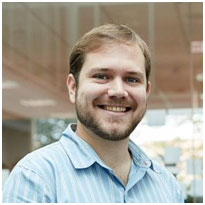Java Performance Optimisation of CPU Heavy or Latency Sensitive Apps (Gareth Siret)
A discussion with examples of some of the techniques we've used to optimise CPU heavy and latency heavy applications: including approaches to caching; data-structure selection and usage; complexity Vs performance trade-offs; and parallelization strategies.
Creating Gaming Resources with an In-browser Code Interpreter and Game Engine (Christopher Brett)
Code for Life by Ocado Technology is a fun and free resource for teaching kids to code. The Rapid Router game is at the heart of it. Find out how – and why – the team created an interpreter to parse and execute user-submitted code in the browser, plus how they developed a browser-based game engine for the code to run against. Featured technologies include JavaScript, Blockly, Python, SVG animation.
| 18:30 – 19:00 | REGISTRATION |
| 19:00 – 21:00 | PRESENTATIONS & WORKSHOPS |
| 21:00 – 21:30 | TALKS & DRINKS |
 |
GARETH SIRET Gareth Siret is a Senior Software Engineer at Ocado Technology in the Simulation Team. He has worked in a wide range of areas in the company: including learning-based personalisation systems, warehouse control systems, and hardware simulations. He uses simulation as a test harness for production systems; to predict the KPIs of future technologies, such as new innovations in automated warehousing; and as an optimisation tool for the algorithms that run these technologies. Gareth primarily codes in Java 8 and Python, but has done work in other areas such as connecting C code to a Java simulation.
|
 |
CHRISTOPHER BRETT Chris Brett is Simulation Team Leader at Ocado Technology. This involves building production systems against a simulation. He uses these simulations as a test harness for production systems. As well as that, they are used to predict the KPIs of a production system, for example the throughput of a warehouse. He uses this feedback to inform business decisions, for example which machinery to buy or how much of it to buy, as well as to optimise the production systems, for example which algorithm to use or how to optimally configure the algorithm. Chris primarily uses Java 8, with Python for supporting tools. Chris also helps with Ocado's Code for Life CSR initiative, which builds computer games that teach kids how to program. |
- Java Developers
- JavaScript Developers
- Everyone who is just curious and/or a true geek
- Everyone who is willing to know more about Ocado Technology

